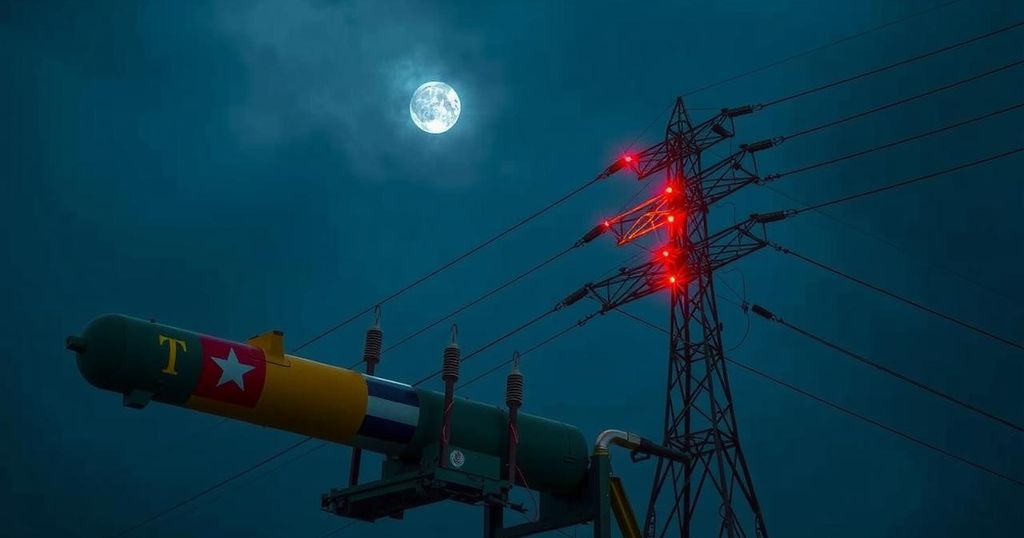Cuba Endures Third Day of Power Outages Amid Hurricane Oscar

Cuba has been without power for three days as Hurricane Oscar approaches. The nation is experiencing its third power grid collapse since Friday, affecting millions. Efforts to restore electricity have failed repeatedly, and the situation poses a significant threat to food security and water supply. Residents are struggling to meet basic needs, and government officials cite various factors, including U.S. sanctions and infrastructure issues, as contributing to the crisis.
As Cuba faces its third consecutive day without electricity, millions of residents remain in the dark following multiple failures of the nation’s aging electrical grid. The Cuban Electrical Union reported a momentary restoration of around 16% of power, which was short-lived as the system once again became overloaded late Saturday night. Officials have yet to provide a clear timeline for when electricity will be fully restored, amplifying concerns among the population. This situation is compounded by the impending arrival of Hurricane Oscar, which is expected to hit the eastern part of Cuba. The hurricane is forecasted to bring damaging winds and surf, putting additional strain on recovery efforts. Hurricane Oscar made its initial landfall on Inagua Island in The Bahamas, with maximum sustained winds recorded at 80 mph. It is projected to reach the northeastern coast of Cuba this afternoon, potentially weakening after landfall but retaining the capacity to become a tropical storm as it moves northward by late Monday. The crisis initiated with the first island-wide blackout occurring on Friday due to a major power plant failure. After initial hopes of restoration, another blackout struck on Saturday morning, leaving the entire nation grappling with significant electricity shortages. The ongoing blackouts threaten to worsen an already alarming crisis, impacting essential services such as water supply and food preservation. Residents of Havana have begun sharing information via WhatsApp regarding power availability and seeking refuge in homes with functioning generators to store necessary medications. Long queues for basic necessities, such as bread, have become commonplace, leading to disputes among those feeling neglected in line. Many citizens are questioning the absence of support from traditional allies like Venezuela, Russia, and Mexico, who would typically provide crucial oil supplies to sustain the energy grid. Despite the chaos on the streets, tourists continue to explore Havana, although many hotels face challenges due to fuel shortages for their generators. Reports from the José Martí International Airport indicate operations are still running on emergency power, causing disruptions in ticketing and air conditioning. The Cuban government attributes the current energy crisis to various factors, including increased sanctions from the United States, damage from recent hurricanes, and systemic issues due to aging infrastructure. In a recent address, Prime Minister Manuel Marrero Cruz explained that the government had to halt much economic activity to ensure some level of power for residents. The Health Minister, José Angel Portal Miranda, assured that health facilities were operating on generators and that essential services continued to be provided despite the crisis.
Cuba’s energy infrastructure has long been known for its inadequacies, leading to frequent power outages that have become a persistent issue for the population. These problems have significantly intensified in the context of worsening economic conditions exacerbated by external sanctions and natural disasters. The arrival of hurricanes complicates recovery efforts, as maintenance and repairs of power systems are hindered. The island’s reliance on foreign allies for oil and support is also noteworthy, particularly given its political environment. The current state of affairs reflects the culmination of years of infrastructural neglect and external pressures.
The situation in Cuba underscores the fragility of the nation’s electrical infrastructure and the dire humanitarian implications of the ongoing outages, exacerbated by an approaching hurricane. The government’s attempts to manage the crisis by limiting economic activities may provide temporary relief but raises concerns regarding the long-term sustainability of these measures. As the country navigates through these challenges, solidarity and support from traditional allies may prove critical in addressing the immediate needs of the Cuban populace and restoring essential services.
Original Source: www.cnn.com








